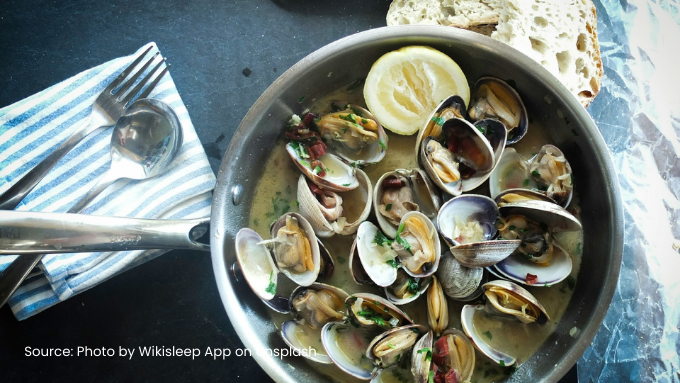Correlation between Knowledge and Attitudes on Arsenic Contamination among Blood Clam (Anadara granosa) Sellers at Traditional Markets in North Surabaya

Downloads
Background: Indonesia, with its vast coastline, has become a major exporter of seafood products, including clams, generating millions of dollars in revenue. However, clams are frequently associated with foodborne illnesses, due to the presence of hazardous marine pollutants like arsenic.
Objective: This research examines the connection between the knowledge and attitudes of sellers, regarding arsenic contamination in blood clams sold at traditional markets in North Surabaya.
Method: The study employed a cross-sectional method, collecting primary data through direct interviews and questionnaires from 35 blood clam sellers in North Surabaya, as well as secondary data from previous studies.
Results: The data were analyzed using the chi-square test, which indicated that there is / was no significant correlation between the sellers' knowledge and attitudes (p > 0.001).
Conclusion: Consequently, it can be concluded that there is a lack of association between the sellers' knowledge and attitudes toward arsenic contamination in blood clams sold at traditional markets in North Surabaya, as evidenced by the high attitude scores (related to healthy practices) but low knowledge scores in the questionnaire.
Acharya, A. S., Prakash, A., Saxena, P., & Nigam, A. (2013). Sampling: Why and how of it. Indian Journal of Medical Specialties, 4(2), 330–333.
Ahamad, A., Madhav, S., Singh, A. K., Kumar, A., & Singh, P. (2020). Types of Water Pollutants: Conventional and Emerging. 21–41. https://doi.org/10.1007/978-981-15-0671-0_3
Aziz, S. N., Boyle, K. J., & Rahman, M. (2006). Knowledge of arsenic in drinking-water: risks and avoidance in Matlab, Bangladesh. J. Health Popul. Nutr., 24(3), 327–335. https://www.ncbi.nlm.nih.gov/pubmed/17366774
Darsini, D., Fahrurrozi, F., & Cahyono, E. A. (2019). Pengetahuan; Artikel Review. Jurnal Keperawatan, 12(1), 13. http://e-journal.lppmdianhusada.ac.id/index.php/jk/article/view/96
Ekawati, E. R., & Yusmiati, S. N. H. (2018). Detection of Salmonella sp., Vibrio sp. and total plate count bacteria on blood cockle (Anadara granosa). IOP Conference Series: Earth and Environmental Science, 102(1), 012086. https://doi.org/10.1088/1755-1315/102/1/012086
Guntur, G., Tiya Yanuar, A., Hikmah Julinda Sari, S., Kurniawan, A., Perikanan dan Ilmu Kelautan, F., Brawijaya, U., veteran, J., Studi Pesisir dan Kelautan, P., & Veteran, J. (2017). Analisis kualitas perairan berdasarkan metode indeks pencemaran di Pesisir Timur Kota Surabaya. Depik, 6(1), 81–89. https://doi.org/10.13170/depik.6.1.5709
IARC Working Group on the Evaluation of Carcinogenic Risks to Humans. (2012). Arsenic, metals, fibres, and dusts. Iarc Monographs on the Evaluation of Carcinogenic Risks to Humans, 100(PT C), 11. /pmc/articles/PMC4781271/
Joshi, A., Kale, S., Chandel, S., & Pal, D. K. (2015). Likert scale: Explored and explained. British Journal of Applied Science & Technology, 7(4), 396–403.
Kementrian Kelautan. (2018). Kelautan dan Perikanan dalam Angka Tahun 2018.
Ko, W. H. (2013). The relationship among food safety knowledge, attitudes and self-reported HACCP practices in restaurant employees. Food Control, 29(1), 192–197. https://doi.org/10.1016/J.FOODCONT.2012.05.076
Lwanga, Kaggwa, S., Lemeshow, Stanley, & World Health Organization. (1991). Sample Size Determination in Health Studies : a Practical Manual.
Maio, G. R., Haddock, G., & Verplanken, B. (2019). The Psychology of Attitudes & Attitude Change (K. Rabot & C. Statham, Eds.; 3rd ed.). SAGE Publications Ltd.
Miranti, E. A., & Adi, A. C. (2018). Hubungan Pengetahuan, Sikap, dan Higiene Perorangan (Personal Hygiene) Penjamah Makanan dalam Penyelenggaraan Makanan di Asrama Putri. Media Gizi Indonesia, 11(2), 120. https://doi.org/10.20473/MGI.V11I2.120-126
Notoatmodjo. (2012). Metode Penelitian Kesehatan. Rineka Cipta.
Patra, E.-, Dewanti-Hariyadi, & Nurtama. (2020). Modeling of food safety knowledge, attitude, and behavior characteristics. Journal Homepage, 4(4), 1045–1052. https://doi.org/10.26656/fr.2017.4(4).375
Putri, N. A., Muhammad, I., & Gafur, A. (2021). View of Bioakumulasi Logam Berat Arsen dalam Kerang Darah (Anadara Granosa) dan Sedimen di Muara Sungai Tallo Makassar. Window of Public Health Journal. https://jurnal.fkm.umi.ac.id/index.php/woph/article/view/148/71
Setia, M. S. (2016). Methodology Series Module 3: Cross-sectional Studies. Indian Journal of Dermatology, 61(3), 261. https://doi.org/10.4103/0019-5154.182410
Shrivastava, A., Ghosh, D., Dash, A., & Bose, S. (2015). Arsenic Contamination in Soil and Sediment in India: Sources, Effects, and Remediation. Current Pollution Reports, 1(1), 35–46. https://doi.org/10.1007/S40726-015-0004-2/FIGURES/3
Siddiky, N. A., Khan, M. S. R., Sarker, M. S., Bhuiyan, M. K. J., Mahmud, A., Rahman, M. T., Ahmed, M. M., & Samad, M. A. (2022). Knowledge, attitude and practice of chicken vendors on food safety and foodborne pathogens at wet markets in Dhaka, Bangladesh. Food Control, 131, 108456. https://doi.org/https://doi.org/10.1016/j.foodcont.2021.108456
Suryono, C. A., Sabdono dan Subagiyo Departemen Ilmu Kelautan, A., Perikanan dan Ilmu Kelautan, F., Diponegoro Jl Soedarto, U., & Kampus UNDIP Tembalang Semarang, S. (2019). Bioakumulasi Arsen (As) dan Merkuri (Hg) pada Bivalvia dari Pesisir Sekitar Demak dan Surabaya Indonesia. Jurnal Kelautan Tropis, 22(2), 157–164. https://doi.org/10.14710/JKT.V22I2.6257
Copyright (c) 2024 Ardyanisa Raihan Kusuma, Ms. Nur Hasanah, Mr. Trias Mahmudiono

This work is licensed under a Creative Commons Attribution-ShareAlike 4.0 International License.
Media Gizi Kesmas by Unair is licensed under a Creative Commons Attribution-ShareAlike 4.0 International License.
1. The journal allows the author(s) to hold the copyright and to retain the publishing right of the article without restrictions.
2. The legal formal aspect of journal publication accessibility refers to Creative Commons Attribution-Share-Alike (CC BY-SA).
3. The Creative Commons Attribution-Share-Alike (CC BY-SA) license allows re-distribution and re-use of a licensed work on the conditions that the creator is appropriately credited and that any derivative work is made available under "the same, similar or a compatible license”. Other than the conditions mentioned above, the editorial board is not responsible for copyright violations.



















